|
|
|
Sort Order |
|
|
|
Items / Page
|
|
|
|
|
|
|
| Srl | Item |
| 1 |
ID:
106959
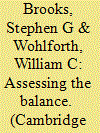

|
|
|
|
|
| Publication |
2011.
|
| Summary/Abstract |
Save for the single issue of balance of power theory's relevance to the current system, where we and some of our critics are in real disagreement (and they are wrong), every aspect of this symposium has been highly productive. Our critics do not directly dispute the proposition that a rapid end of a single superpower world is extremely unlikely. They generally endorsed our core finding that the systemic constraints featured in IR scholarship are largely inoperative with respect to a United States that remains the sole superpower. These essays are consequently devoted mainly to discussing the implications of our findings and the future research agenda. In particular, they developed serious challenges to the idea of US led institutional revisionism, generated new ideas about both systemic and non-systemic constraints, and suggested potentially powerful theories about constraints on other states besides the United States.
|
|
|
|
|
|
|
|
|
|
|
|
|
|
|
|
| 2 |
ID:
111590
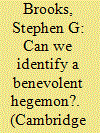

|
|
|
|
|
| Publication |
2012.
|
| Summary/Abstract |
Analysts frequently assess the underlying character of the state with the largest concentration of material capabilities in the system-the hegemon. Scholars typically differentiate a hegemon that is benevolent from one that is predatory. In the current era, many have wondered about how to best characterise the United States. Scholars became particularly interested in this question during the George W Bush administration and reached strikingly different answers. This article aims to provide greater clarity regarding how we reach a judgment about the underlying character of a hegemon, in general, and the United States, in particular. The first section analyses the policies that the hegemon adopts towards the global economic system. The second section considers the hegemon's policies in the security realm, focusing on the key issue of how unilateralism should be conceptualised. The final section discusses the potential significance the 'hegemonic reference point'-that is, the comparison that is made between the hegemon and the leading alternative leader of the global system.
|
|
|
|
|
|
|
|
|
|
|
|
|
|
|
|
| 3 |
ID:
152340
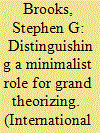

|
|
|
|
|
| Summary/Abstract |
A major theoretical shortcoming in international relations (IR) is the lack of any semblance of a common understanding regarding the role of grand theory. This article argues that explicit theoretical work of this sort is useful, but that a search for a single overarching grand theory to guide inquiry is misguided and that the primary business of IR is to form and evaluate middle-range theories.
|
|
|
|
|
|
|
|
|
|
|
|
|
|
|
|
| 4 |
ID:
117446


|
|
|
|
|
| Publication |
2012.
|
| Summary/Abstract |
After sixty-five years of pursuing a grand strategy of global leadership-nearly a third of which transpired without a peer great power rival-has the time come for the United States to switch to a strategy of retrenchment? According to most security studies scholars who write on the future of U.S. grand strategy, the answer is an unambiguous yes: they argue that the United States should curtail or eliminate its overseas military presence, abolish or dramatically reduce its global security commitments, and minimize or eschew efforts to foster and lead the liberal institutional order. Thus far, the arguments for retrenchment have gone largely unanswered by international relations scholars. An evaluation of these arguments requires a systematic analysis that directly assesses the core claim of retrenchment advocates that the current "deep engagement" grand strategy is not in the national interests of the United States. This analysis shows that advocates of retrenchment radically overestimate the costs of deep engagement and underestimate its benefits. We conclude that the fundamental choice to retain a grand strategy of deep engagement after the Cold War is just what the preponderance of international relations scholarship would expect a rational, self-interested leading power in America's position to do.
|
|
|
|
|
|
|
|
|
|
|
|
|
|
|
|
| 5 |
ID:
124397
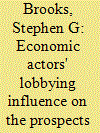

|
|
|
|
|
| Publication |
2013.
|
| Summary/Abstract |
Political scientists and economists have long been interested in the role of special interests in the policymaking process. In the past few years, a series of important new books have argued forcefully that the lobbying activities of economic actors have an important influence on the prospects for war and peace. All of these analyses claim that whether economic actors enhance or decrease the likelihood of conflict ultimately depends on the domestic political balance between economic actors who have a strong vested interest in pushing for peace versus those that do not. I advance two contrary arguments. At least among the advanced states, I posit there are no longer any economic actors who will be favorable toward war and who will lobby the government with this preference. All of the identified mechanisms that previously contributed to such lobbying in these states have been swept away with the end of colonialism and the rise of economic globalization. In particular, I show that the current structure of the global economy now makes it feasible for foreign direct investment to serve as an effective substitute for conquest in a way that was not possible in previous eras. My second argument concerns those economic actors in advanced states with a preference for peace. I posit that it has become unnecessary for them to directly lobby the government to avoid war on economic grounds because economic globalization-the accumulation of decisions by economic actors throughout the globe-now has sufficiently clear economic incentives for leaders.
|
|
|
|
|
|
|
|
|
|
|
|
|
|
|
|
| 6 |
ID:
177911
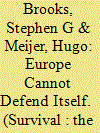

|
|
|
|
|
| Summary/Abstract |
Europe is unable to pool and effectively employ military power due to its lack of an integrated command structure and its deficient C4ISR capacity.
|
|
|
|
|
|
|
|
|
|
|
|
|
|
|
|
| 7 |
ID:
021471
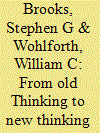

|
|
|
|
|
| Publication |
Spring 2002.
|
| Description |
93-111
|
|
|
|
|
|
|
|
|
|
|
|
|
|
|
|
| 8 |
ID:
065314


|
|
|
| 9 |
ID:
177841
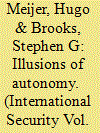

|
|
|
|
|
| Summary/Abstract |
Europe's security landscape has changed dramatically in the past decade amid Russia's resurgence, mounting doubts about the long-term reliability of the U.S. security commitment, and Europe's growing aspiration for strategic autonomy. This changed security landscape raises an important counterfactual question: Could Europeans develop an autonomous defense capacity if the United States withdrew completely from Europe? The answer to this question has major implications for a range of policy issues and for the ongoing U.S. grand strategy debate in light of the prominent argument by U.S. “restraint” scholars that Europe can easily defend itself. Addressing this question requires an examination of the historical evolution as well as the current and likely future state of European interests and defense capacity. It shows that any European effort to achieve strategic autonomy would be fundamentally hampered by two mutually reinforcing constraints: “strategic cacophony,” namely profound, continent-wide divergences across all domains of national defense policies—most notably, threat perceptions; and severe military capacity shortfalls that would be very costly and time-consuming to close. As a result, Europeans are highly unlikely to develop an autonomous defense capacity anytime soon, even if the United States were to fully withdraw from the continent.
|
|
|
|
|
|
|
|
|
|
|
|
|
|
|
|
| 10 |
ID:
067390
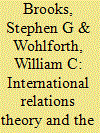

|
|
|
| 11 |
ID:
144610
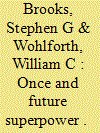

|
|
|
|
|
| Summary/Abstract |
After two and a half decades, is the United States’ run as the world’s sole superpower [1] coming to an end? Many say yes, seeing a rising China [2]ready to catch up to or even surpass the United States in the near future. By many measures, after all, China’s economy is on track to become the world’s biggest, and even if its growth slows, it will still outpace that of the United States for many years. Its coffers overflowing, Beijing has used its new wealth to attract friends, deter enemies, modernize its military, and aggressively assert sovereignty claims in its periphery. For many, therefore, the question is not whether China will become a superpower but just how soon.
|
|
|
|
|
|
|
|
|
|
|
|
|
|
|
|
| 12 |
ID:
080508
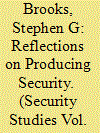

|
|
|
|
|
| Publication |
2009.
|
| Summary/Abstract |
This symposium has provided a priceless opportunity to advance debate on how global commerce influences international security. Of particular importance is that these articles help clarify exactly how the globalization of production affects great power security relations. My article comprises four parts, the first of which outlines the current state of the debate on how the globalization of production influences security and discusses why further research on this topic is needed. Section two examines Jonathan Kirshner's article, which helpfully shows why my conclusion that the globalization of production is stabilizing ultimately pertains to the severity of great power war, not its initiation. Section three discusses Jonathan Caverely's article and demonstrates how almost all the critical issues raised by Caverley are consistent with Producing Security. Section four turns to Eugene Gholz's contribution, which explores the boundary conditions of some of my arguments and usefully underscores that the globalization of production does not influence the benefits of conquest in advanced countries nearly as strongly in the short-term as it does in the long-term.
|
|
|
|
|
|
|
|
|
|
|
|
|
|
|
|
| 13 |
ID:
086024
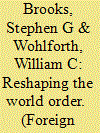

|
|
|
|
|
| Publication |
2009.
|
| Summary/Abstract |
Creating a league of democracies, revamping the UN Security Council, revitalizing the nuclear nonproliferation regime -- proposals for revising international institutions are all the rage these days. And for good reason: no one sitting down to design the perfect global framework for the twenty-first century would come up with anything like the current one. The existing architecture is a relic of the preoccupations and power relationships of the middle of the last century -- out of sync with today's world of rising powers and new challenges, from terrorism and nuclear proliferation to financial instability and global warming.It is one thing to agree that change is needed, but quite another to settle on its specifics. As soon as the conversation shifts to brass tacks, competing visions begin to clash. In an anarchic world of self-interested states -- that is to say, in the real world -- the chances that those states will cooperate are best when a hegemon takes the lead. There are, of course, good reasons to question whether the United States, the only contender for such a role today, is up to the task. Under the George W. Bush administration, consideration of global institutional change fell through the cracks. The administration did not invest much in international institutions and tended to denigrate them for hindering, rather than enabling, the realization of U.S. interests. But with the election of President Barack Obama, the United States' reluctance to push for institutional change now appears to have ended. In a 2007 address to the Chicago Council on Global Affairs, Obama stressed that "it was America that largely built a system of international institutions that carried us through the Cold War. . . . Instead of constraining our power, these institutions magnified it." "Today it's become fashionable to disparage the United Nations, the World Bank, and other international organizations," he continued. "In fact, reform of these bodies is urgently needed if they are to keep pace with the fast-moving threats we face."
|
|
|
|
|
|
|
|
|
|
|
|
|
|
|
|
| 14 |
ID:
143221
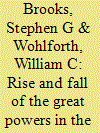

|
|
|
|
|
| Summary/Abstract |
Unipolarity is arguably the most popular concept used to analyze the U.S. global position that emerged in 1991, but the concept is totally inadequate for assessing how that position has changed in the years since. A new framework that avoids unipolarity's conceptual pitfalls and provides a systematic approach to measuring how the distribution of capabilities is changing in twenty-first-century global politics demonstrates that the United States will long remain the only state with the capability to be a superpower. In addition, China is in a class by itself, one that the unipolarity concept cannot explain. To assess the speed with which China's rise might transform this into something other than a one-superpower system, analogies from past power transitions are misleading. Unlike past rising powers, China is at a much lower technological level than the leading state, and the gap separating Chinese and U.S. military capabilities is much larger than it was in the past. In addition, the very nature of power has changed: the greatly enhanced difficulty of converting economic capacity into military capacity makes the transition from a great power to a superpower much harder now than it was in the past. Still, China's rise is real and change is afoot.
|
|
|
|
|
|
|
|
|
|
|
|
|
|
|
|
|
|
|
|
|